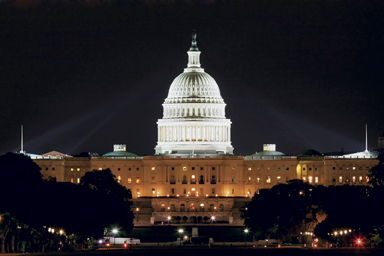Public Policy Analysis & Opinion
NAIC calls out the European Union’s end run, but offers a flawed alternative
A federal charter for reinsurance—or any entity that trades in risk ceded by primary writers—would establish a regulatory baseline to foster a level playing field.
On September 28, 2016, the National Association of Insurance Commissioners (NAIC) asked Congress to pressure U.S. trade negotiators to protect the myriad parochial provisions that pepper the body of American insurance law at the state level. Tennessee Insurance Commissioner Julie Mix McPeak, who also serves as vice president of the NAIC, delivered the plea to a subcommittee of the House Financial Services Committee, in which she complained about U.S. negotiators meeting representatives of the European Union (EU):
“After more than a decade of dialogue and information exchange, the EU has all the information it needs to recognize the U.S. insurance regulatory system and avoid future regulatory retaliation,” McPeak testified. “Instead of negotiating a potentially preemptive agreement behind closed doors to solve a problem of the EU’s creation, we encourage our federal colleagues to push back on the EU and urge them to reconsider their laws before agreeing to preempt ours.”
Strange fashions
Commissioner McPeak’s testimony is just the latest salvo in a commercial proxy war between the European and U.S. reinsurance sectors. In this case, the NAIC advocates in the interest of the American reinsurance sector like any other lobbyist, except that the association—a Delaware-chartered corporation—operates in the drag of a quasi-public agency.
That said, the preemption of law by “agreement” is not friendly to the tenets of self-government. If the administration believes that state-by-state action of a sector of international commerce offends the public interest, it should go to Congress and seek a federal law.
In Congress, lawmakers should enact statutory provisions that protect the public’s national interest; their actions should include the application of the antitrust laws and fair trade oversight. If European Union-based reinsurers cannot operate under such a system, no one is forcing them to siphon American premium dollars home.
However, the NAIC’s record of donning the robes of “states’ rights” in defense of special-interest—shaped policies under the pretense of insurance regulation—lacks credibility. The NAIC testified in defense of public policies written behind the closed doors of the association’s conventions, where the majority of attendees must pay a fee to gain entry. Of those who “pay to play,” the vast majority lobby on behalf of commercial interests.
No, Virginia, this system never came up in your civics class.
National interest
For more than a century, American policymakers have professed the belief that it is in the national interest for the United States to foster a domestic reinsurance sector.
During the First and Second World Wars, American policymakers worried about the influence of the Triple Alliance (Germany, Austria-Hungary, and Italy) and the Axis powers (Germany, Italy and Japan) on the American economy through reinsurance treaties. For example, even before U.S. entry into either World War, reinsurers could inhibit American shipping by shaping or restricting marine policies reinsured with German-based companies. Furthermore, after World War II, American military occupation investigators found that the Nazi regime had used reinsurers in Axis countries to traffic stolen capital and spy on Allied businesses. These findings solidified the belief that it was in the American national interest for the United States to maintain a domestic reinsurance sector.
In most policy sectors, based on central tenets of the U.S. Constitution, matters of national interest rest with the federal government.
In the case of reinsurance, the policy development happens at the NAIC. With the enveloping guidance of a corps of lobbyists, the NAIC and state officials have endeavored to craft a “regulatory” framework, which is “just protectionist enough,” but not “too protectionist.” Once policy proposals leave the confines of the NAIC, special-interest lobbies get additional chances at shaping policy in their image and likeness at the state level.
Anti-Federalist
For those international reinsurance executives who might be reading this column for the first time, let’s review how the so-called “state-by-state system of insurance ‘regulation’” came about.
The business of insurance is interstate commerce. Certainly reinsurance qualifies as interstate commerce—often international trade. In the well-informed design of the Federalist framers of the Constitution, jurisdiction over interstate commerce and international trade rests with the Congress.
If overseas reinsurance executives find it difficult to understand why they must deal with a checkerboard of local rules enforced by juiced-in political fixers, it just might be that they have read the U.S. Constitution.
Perhaps out of frustration, these international executives will consult the Federalist Papers and the Debates on the Constitution, and they will notice that the group that argued for state jurisdiction over national interests lost the debate.
Hamilton, Madison, and Jay warned us in the Federalist Papers that the states could not serve the citizens’ national interest because of state officials’ slavish responsiveness to local special interests. American rules governing the reinsurance sector serve only to prove the brilliance of Hamilton, Madison, and Jay. The winners constructed a federal system to create one nation, with a national government empowered to serve the sovereign people’s national interest.
The Anti-Federalists argued for a contract among sovereign states, with only a weak federal legislature. They lost. Not even the most fervent Anti-Federalist foresaw the creation of national policy through the machinations of a private corporation that reports to no legislature or magistrate, i.e., the NAIC.
Paul’s legacy
The NAIC would not have a role in this debate, or even exist, if the Supreme Court of the United States had not issued a screwball opinion in 1869. The decision arose from insurance interests who wanted federal officials to preempt parochial state rules through Congressional legislation.
The decision in Paul v. Virginia found that the business of insurance was not commerce; therefore, it could not be interstate commerce, which the Constitution delegates to the Congress, which can empower the executive branch to regulate.
As in the court’s decision in the Slaughterhouse Cases, the Paul decision is one of a series of decisions aimed at transferring federal powers to the states. In Age of Betrayal: The Triumph of Money in America, 1865-1900, the author, Jack Beatty, explains the former Supreme Court ruling as conservative activism in the immediate post-Civil War years. The Court acted to protect the southern states’ frameworks for white supremacy from federal reforms by reassigning jurisdiction from the federal government to state governments. In short, the “states’ prerogative” over insurance has more to do with political dynamics recounted in Birth of a Nation than any provision of the U.S. Constitution.
Residual stain
The Supreme Court overturned the insurance-related provisions of the Paul decision in 1944, but a residual stain lingers from those wrongly decided insurance provisions of the opinion. Not wanting to disturb the insurance sector during a world war and an election year, federal officials crafted a statutory compromise response to the Court’s reversal.
In what President Franklin Roosevelt would die believing was a temporary measure, the Congress made a limited and contingent delegation of jurisdiction over insurance through the McCarran-Ferguson Act of 1945. As such, and contrary to the advice and consent of the Federalist framers of the Constitution, individual states—and whatever the NAIC claims to be—set national policy through local jurisdictions.
The twin national interests of regulating international trade in reinsurance in the United States and fostering a domestic reinsurance sector ended up being removed from the Federalist framework.
Federal charter
In no way should this column be understood as an argument to just open the doors to any “reinsurance facility” that seeks business in the United States. The legend and lore of the insurance enterprise are punctuated with colorful tales concerning reinsurance.
Just as the political histories of American states include sagas of “bossism” and “machines,” the history of reinsurance includes yarns staged in island settings throughout the Caribbean, Atlantic, and the English Channel, where any “supervisor” must prove to have at least one blind eye.
Domestically, the cartel power of a small number of reinsurers became clear after the terrorist attacks of September 2001. At that time, a small number of reinsurance executives met and colluded to stop writing reinsurance until Congress created a financial backstop for their sector. The cartel action froze many kinds of construction until Congress granted a much wider backstop than was required to deal with terrorism-related claims.
Nor am I saying that any framework set up by the federal government will serve the twin national interests discussed above. Certainly Congress could establish a rubber-stamp system for chartering that would mean nothing.
Not since former U.S. Representative John Dingell left public service has a member of Congress seemed to understand and care about the impact of reinsurance on the primary insurance market. A technicality slipped into reinsurance treaties can force changes to the price and design of insurance products throughout the market. In legislation Dingell introduced in the early 1990s, he proposed that any insurer or holding company that ceded or assumed risk through reinsurance should be compelled to secure a federal charter.
A federal charter for reinsurance—or any entity that trades in risk ceded by primary writers—would establish a regulatory baseline to foster a level playing field. An affirmative federal charter, which established minimum collateral requirements, market and financial data filing, and other disclosures, would preempt the checkerboard of state rules and also protect the public interest.
The author:
Kevin P. Hennosy is an insurance writer who specializes in the history and politics of insurance regulation. He began his insurance career in the regulatory compliance office of Nationwide Insurance Companies and then served as public affairs manager for the National Association of Insurance Commissioners. Since leaving the NAIC staff, he has written extensively on insurance regulation and has testified before the NAIC as a consumer advocate.






